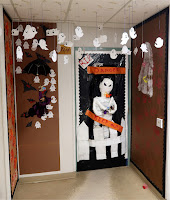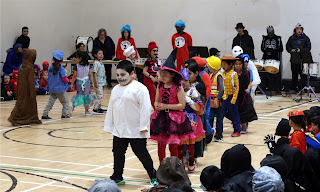Inuujaq School held a National Aboriginal Veterans Day (NAVD) & Remembrance Day assembly on Friday, November 10. NAVD is on November 8 and Remembrance Day is on November 11. Remembrance Day is a statutory holiday in Nunavut, so school is closed if it’s on a weekday. This year, November 11 was on a Saturday. (More on this coming up). The school’s Events Committee was busy the last couple of weeks, planning three large school events. (The previous two were Halloween and International Inuit Day).
Classes were encouraged to make posters, wreathes, and wear poppies for the assembly. I was put in charge of the audio/visual equipment. Invitations were extended to Elders, RCMP, and two military officers from Winnipeg visiting the local cadet corps.
The assembly began at 10:45am with the principal doing the Opening Remarks. A staff member translated the speech into Inuktitut. The learning coach then lit the ceremonial qulliq. Everyone stood for the playing of O Canada. I played the trilingual version recorded by the Inuksuk High School Drum Dancers. They’re based in Iqaluit and are led by Dr. Mary Piercey, the music teacher.
Everyone took their seats and the assembly continued with the laying of wreathes prepared by classes. A local RCMP officer led the procession and the wreathes were taped to the wall around a large mural poster made by high school students. Everyone then stood for the playing of Last Post and then remained standing for the One Minute of Silence (OMOS). I played a short video from the YouTube channel Simple History titled, “The Short Story Of The Poppy”, after the OMOS. The video explains why we wear poppies as a symbol of remembrance for those who gave their lives in war.
The Grade 6 class read John McCrae’s famous poem In Flanders Fields in Inuktitut and English. Two high school students, a teacher, and one of the visiting military officers read a passage from Eddy Weetaltuk’s memoir, From the Tundra to the Trenches, about one of his experiences in the Korean War. Continuing the theme of Indigenous Peoples contributions to past war efforts, I played a tv video clip made by APTN in 2020 about Arctic Bay Elder Qapik Attagutsiak’s experience collecting animal bones during the Second World War. “The bones were then shipped south to be used for making munitions, glue, and fertilizer.”
The vice-principal did the Closing Remarks and the Grade 1 teacher concluded the assembly with a prayer. Classes had their pictures taken in front of the Remembrance Day decorations before returning to class. High school students stayed behind to put away chairs, tables, and sound system.
3045 Army Cadet Corps held a Remembrance Day & NAVD Ceremony at the community hall on the morning of November 11. I was allowed to use the school’s decorations. The cadets & I arrived at the community hall an hour early for setup. The visiting officers also assisted. The cadets then changed into their uniforms. Doors opened at 10:30am and the ceremony began at 10:45am.
The cadet flag party entered the hall carrying the flags of Canada and the cadet program. They deposited the colours in the left corner of the hall and took up positions as Left Markers. The cadets then marched in, followed by the RCMP. The cadets assembled next to the Left Markers, and the RCMP sat next to them.
A local minister did the Opening Prayer. I continued with my Welcome Address. I recruited a former coworker to be the Inuktitut translator. I kept my speech short and to the point, talking about the beginnings of Remembrance Day, Canada’s contributions to both world wars and beyond, the sad reality of conflicts still happening around the world, and the hope that world peace will be achieved soon. Everyone stood for the playing of the national anthem. This was followed by a Bible reading in both languages. Next came the hymn Abide With Me. I provided the instrumental music on piano. I surprisingly did well.
The middle section of the ceremony is the most important but also challenging for cadets . . . and possibly the audience. Cadets are required to stand at attention for six minutes. The audience just stands. Standing at attention for 6 minutes is quite a length of time so the cadets practiced beforehand. The middle section begins with the playing of Last Post, followed by the Minute of Silence. The Minute of Silence is timed to 11am, the same time the guns fell silent in Europe, and the First World War came to an end. (I am aware it was actually 11:11:11, but it’s difficult to time it exactly). The last two music tracks are Piper’s Lament and Reveille.
Everyone sat down as a cadet and two community members read the Act Of Remembrance in English, French, and Inuktitut. It’s a short verse. Another cadet and a schoolteacher read Psalm 121, the second Bible Reading in the program.
Two
cadets did a short presentation about Lt. Col. John McCrae and the poppy. Three cadets then read his poem In
Flanders Fields. A cadet then came forward
and placed a wreathe in front of the speaker’s podium. The RCMP did the same.
The second hymn the audience sang was O God Our Help In Ages Past. I also played the piano. Everyone remained standing for the playing of God Save The King. (This was a recorded track). An Elder did the Closing Prayer and I concluded the ceremony with the Closing Remarks. The RCMP & cadets then marched out of the hall.
The
cadets, RCMP, visiting officers, and I came together for a group photograph. Once that was completed, the cadets were
given a break to mingle with friends & family. I personally thanked the RCMP and everyone
involved in the ceremony for their time & assistance. The cadets & I assisted the community
hall staff in cleaning up. Everyone was
home in time for lunch.
Lest
We Forget.

















.JPG)
.JPG)
.JPG)











.JPG)

.JPG)
.JPG)






.JPG)





